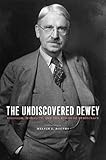The Undiscovered Dewey : Religion, Morality, and the Ethos of Democracy / Melvin Rogers.
Material type: TextPublisher: New York, NY : Columbia University Press, [2008]Copyright date: ©2008Description: 1 online resource (352 p.)Content type:
TextPublisher: New York, NY : Columbia University Press, [2008]Copyright date: ©2008Description: 1 online resource (352 p.)Content type: - 9780231144872
- 9780231516167
- 191 22
- B945.D44 R59 2009
- B945D44R642012
- online - DeGruyter
- Issued also in print.
| Item type | Current library | Call number | URL | Status | Notes | Barcode | |
|---|---|---|---|---|---|---|---|
 eBook
eBook
|
Biblioteca "Angelicum" Pont. Univ. S.Tommaso d'Aquino Nuvola online | online - DeGruyter (Browse shelf(Opens below)) | Online access | Not for loan (Accesso limitato) | Accesso per gli utenti autorizzati / Access for authorized users | (dgr)9780231516167 |
Browsing Biblioteca "Angelicum" Pont. Univ. S.Tommaso d'Aquino shelves, Shelving location: Nuvola online Close shelf browser (Hides shelf browser)

|

|

|

|

|

|

|
||
| online - DeGruyter Literature, Life, and Modernity / | online - DeGruyter Art's Claim to Truth / | online - DeGruyter Modernity and the Text : Revisions of German Modernism / | online - DeGruyter The Undiscovered Dewey : Religion, Morality, and the Ethos of Democracy / | online - DeGruyter Hear Us Out : Conversations with Gay Novelists / | online - DeGruyter Kinship with Monkeys : The Guajá Foragers of Eastern Amazonia / | online - DeGruyter But Enough About Me : Why We Read Other People's Lives / |
Frontmatter -- Contents -- Preface -- Acknowledgments -- Abbreviations -- Introduction -- Part I. From Certainty to Contingency -- 1. Protestant Self-Assertion and Spiritual Sickness -- 2.Agency and Inquiry After Darwin -- Part II. Religion, the Moral Life, and Democracy -- 3. Faith and Democratic Piety -- 4. Within the Space of Moral Reflection -- 5. Constraining Elites and Managing Power -- Epilogue -- Notes -- Bibliography -- Index
restricted access online access with authorization star
http://purl.org/coar/access_right/c_16ec
The Undiscovered Dewey explores the profound influence of evolution and its corresponding ideas of contingency and uncertainty on John Dewey's philosophy of action, particularly its argument that inquiry proceeds from the uncertainty of human activity. Dewey separated the meaningfulness of inquiry from a larger metaphysical story concerning the certainty of human progress. He then connected this thread to the way in which our reflective capacities aid us in improving our lives. Dewey therefore launched a new understanding of the modern self that encouraged intervention in social and natural environments but which nonetheless demanded courage and humility because of the intimate relationship between action and uncertainty. Melvin L. Rogers explicitly connects Dewey's theory of inquiry to his religious, moral, and political philosophy. He argues that, contrary to common belief, Dewey sought a place for religious commitment within a democratic society sensitive to modern pluralism. Against those who regard Dewey as indifferent to moral conflict, Rogers points to Dewey's appreciation for the incommensurability of our ethical commitments. His deep respect for modern pluralism, argues Rogers, led Dewey to articulate a negotiation between experts and the public so that power did not lapse into domination. Exhibiting an abiding faith in the reflective and contestable character of inquiry, Dewey strongly engaged with the complexity of our religious, moral, and political lives.
Issued also in print.
Mode of access: Internet via World Wide Web.
In English.
Description based on online resource; title from PDF title page (publisher's Web site, viewed 02. Mrz 2022)


